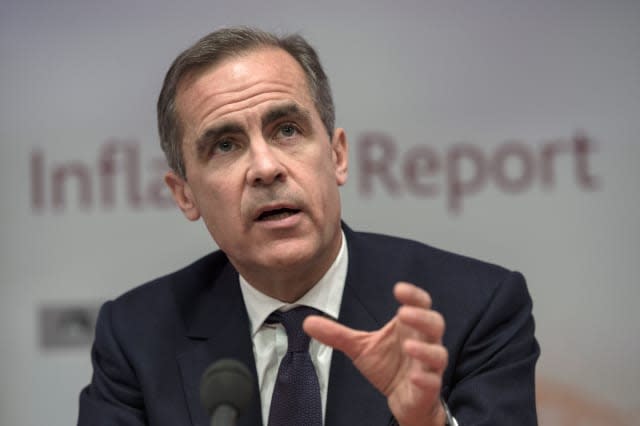Inflation falls to zero - and may go lower

Inflation fell to zero last month setting the UK on course for a period of falling prices for the first time in half a century.
The Consumer Price Index (CPI) measure of inflation dropped after recording 0.3% in January, according to the Office for National Statistics.
It was a sharper than expected fall and sets a new record low for CPI since comparable records began in 1989.
Inflation is expected to dip further in coming months. An experimental model created by the ONS suggests the last time it was negative was in March 1960, at minus 0.6%.
Downward pressure on the pound
The surprise scale of February's fall is likely to push back the expected timing of an interest rates hike, currently pencilled in for 2016, putting downward pressure on the pound.
Rates have been held at 0.5% for six years but Bank of England chief economist Andy Haldane has said that in the light of low inflation the next move was as likely to be a cut as a hike.
Low inflation benefits consumers because it means their wages go further, but policy makers fear a prolonged period of negative CPI could have damaging effects.
That is because it is feared that deflation would cause consumers to delay spending and firms to put back investment.
Pricier repayments
At the same time, debt repayments such as mortgages would become more expensive in real terms.
This would threaten what Bank of England governor Mark Carney has described as a "clear and present danger" for the UK's indebted households and businesses.
The Bank must to try to return CPI towards 2% and Mr Carney was obliged to write a letter of explanation to Chancellor George Osborne earlier this year when it fell more than 1% off this target.
The latest fall came as food and non-alcoholic beverage prices saw a record year-on-year drop of 3.3%.
They have been flat or falling for 10 months - the longest stretch since 2000 - amid the supermarket price war.
Staple products such as milk, cheese, eggs, bread, jam and chocolate were among those putting downward pressure on CPI.
Cheaper fuel
Motor fuels also saw a record decline, at 16.6%. A litre of petrol fell to 107p in February from 108.3p in January, down from 129p in February last year.
CPI was also driven down by some retail prices that saw smaller than usual increases in February after January discounts.
Products in the category of recreation and culture were little changed on January, with the main downward pressure from laptops, tablets and printers plus books and games, and toys and hobbies.
Meanwhile furniture prices rose by less than they did a year ago following January discounts.
Retail Prices Index (RPI) inflation, a separate measure which includes housing costs, fell to 1% from 1% in January.
Chief Secretary to the Treasury Danny Alexander said: "Today's zero inflation is the right sort of price freeze, with low oil prices feeding through to prices.
"It's yet another month that sees earnings pulling ahead of prices, which will be a great help to millions of families."
Vicky Redwood, chief UK economist at Capital Economics, said: "The UK is now within a whisker of deflation.
"It looks odds-on that inflation will turn negative in March, when the cut in gas prices by British Gas (the utility company with the biggest market share) will show up in the inflation figures for the first time.
"And inflation is then likely to remain around zero/slightly negative for the rest of the year.
"But we doubt that this will turn into more serious and engrained deflation, given that inflation expectations seem well-anchored.
"We still think that deflation in the UK will be a 'good' development, giving households' incomes a welcome boost and supporting the economic recovery this year."
'Boon to the economy'
Chris Williamson, chief economist at Markit, said: "Rather than being a concern, the drop in inflation is a boon to the economy, providing households with greater spending power at a time when pay growth remains frustratingly weak.
"The concern is, of course, that consumer spending could wane as soon as inflation starts to pick up again unless we see stronger wage growth materialise soon."
TUC general secretary Frances O'Grady said: "Zero inflation is a reminder of how fragile the economy remains.
"Stagnating prices are not a sound foundation for the strong and sustained pay rises that workers have waited so long for.
"With deflation on the horizon, the Chancellor's plans for extreme cuts after the election look more and more like a suicide note for the UK economy."
Ben Brettell, senior economist at stockbrokers Hargreaves Lansdown, said: "I believe a cut in interest rates looks most unlikely but, with inflation at zero and deflation looming, it is almost impossible to see them rising either.
"It therefore appears interest rates will be stuck at 0.5% for some time yet - I don't see them rising until mid-2016 at the very earliest."
Mr Osborne said on Twitter: "Inflation at zero is a first for the British economy. Low inflation due to falling oil prices is good news for family budgets.
"Prices are frozen and, as the recovery from Labour's Great Recession strengthens, their economic argument has literally come to nought."
Prime Minister David Cameron tweeted: "Inflation is running at 0% - the lowest on record. It's good news for family budgets and a sign our long-term plan is working."

Inflation on AOL Money
State pension rising twice as fast as workers' pay
One in 10 at risk of costly pension blunders
WWI centenary: how our nation's finances have changed



